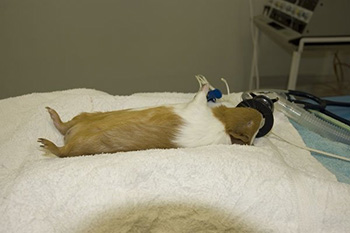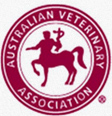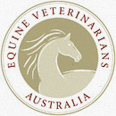Small Animals
 Rabbits
Rabbits
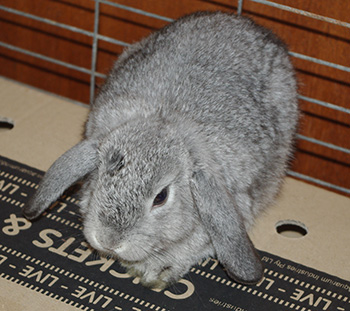
Diet
Rabbits should be fed the types of food they are adapted to eating. In the wild, rabbits eat predominantly grass. They may graze for up to 6-8 hours a day. Their whole digestive tract from their teeth right down to the end of their gastrointestinal tract is adapted to this diet and eating habit.
Providing grass or grass hay to pet rabbits is critical to maintain health. Eating grass/grass hay provides for long periods of chewing which is necessary to wear down their continuously erupting and growing teeth thereby helping to prevent dental disease (which is a common health problem in pet rabbits). Rabbits are also intelligent animals and chewing on grass or grass hay helps to keep them occupied and prevent boredom.
The high fibre content of grass and grass hay is also crucial for normal digestion. If the diet is too low in fibre, fatal digestive problems can occur - another common problem in pet rabbits. Feeding the right diet is one of the most important factors in maintaining a healthy rabbit.
To ensure your rabbit has a healthy balanced diet, 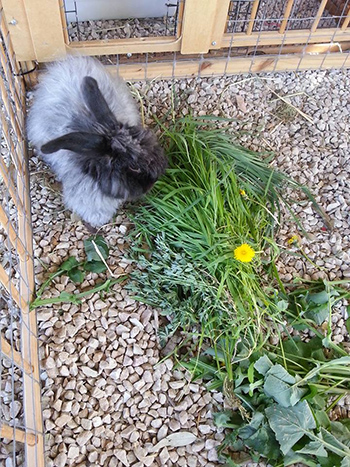 you should provide:
you should provide:
- A constant supply of good quality fresh grass and grass hay (they should comprise about 80% of the overall diet) - e.g. Timothy, Oaten, Wheaten, Pasture, Paddock, Meadow or Ryegrass hays. Rabbits should not be fed Lucerne (alfalfa) or Clover hays as they are too high in protein and calcium. Grass or grass hay is paramount in providing sufficient fibre for gastrointestinal health and encouraging chewing for long periods of time for healthy teeth.
- Plenty of fresh leafy greens & vegetables. As a guide, feed around two packed cups of leafy greens per kg body weight per day. Some examples are: Vegies: broccoli, celery, endive, beet/carrot tops, brussels sprouts, spinach leaves, bok choy; other Asian greens and dark leafed lettuce varieties; Herbs: parsley, dandelion, coriander, basil, dill, and mint
- Treats may be offered in small quantities (1-2 tablespoons per rabbit per day). Some examples are: most fruits, root vegetables (carrot, sweet potato) and capsicum
- High quality commercial rabbit pellets with a minimum crude fibre >18% (Indigestible fibre content >12.5%) may be offered in small quantities only, but these should not form the main part of the diet
- Avoid cereal/grain mixes
- Providing other objects to chew on is also a good idea, try offering items such as wooden chew blocks or old telephone books
- You should aim to keep feeds and feeding habits consistent. Any changes to the diet must be made gradually (over a 2-3 week period) to minimise digestive upsets
- Always have fresh clean water available.
- Do not feed the following: cereals, grains, nuts, seeds, corn, beans, peas, breads, biscuits, sweets, sugar, breakfast cereals, chocolate or any garden plants that are toxic to rabbits.
Thank you to the RSPCA Australia Knowledgebase for this information.
Desexing
 Desexing your rabbit, whether male or female, can stop hormonally driven aggressive behaviour such as scratching, biting or spraying. It will also make keeping rabbits in a group or couple a much more peaceful affair and eliminate the risk of some diseases that are relatively common in undesexed rabbits such as uterine cancer. Uterine cancer can occur in up to 60% of undesexed rabbits over three years of age. We recommend desexing between 3 and 6 months of age.
Desexing your rabbit, whether male or female, can stop hormonally driven aggressive behaviour such as scratching, biting or spraying. It will also make keeping rabbits in a group or couple a much more peaceful affair and eliminate the risk of some diseases that are relatively common in undesexed rabbits such as uterine cancer. Uterine cancer can occur in up to 60% of undesexed rabbits over three years of age. We recommend desexing between 3 and 6 months of age.
Teeth
Rabbits have teeth that grow continually throughout their lives. If teeth aren’t aligned correctly, overgrowth can occur and cause problems such as mouth ulcers and difficulty chewing. At the clinic we have a professional dental unit including ultrasonic scaler, power drill and specialised rodent dental instruments that can be used for keeping your rabbit’s teeth trimmed and healthy.
Vaccination
We advise vaccination annually against calicivirus, a nasty infection that causes internal bleeding and sudden death. The virus is spread by mosquito or direct contact with an infected rabbit. Vaccination is from 3 months of age.
 Guinea Pigs
Guinea Pigs
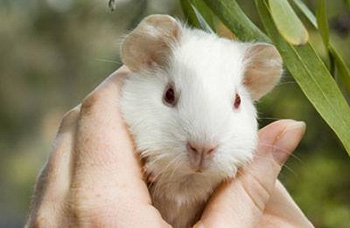 Guinea pigs are friendly and easily tamed pets but do have needs that are specific to the species. They are social animals so should be kept in a group situation. If kept by themselves they will require lots of attention and handling from their owners to keep them stimulated. Both males and females can fight, particularly if they have not been brought up together – desexing can help this.
Guinea pigs are friendly and easily tamed pets but do have needs that are specific to the species. They are social animals so should be kept in a group situation. If kept by themselves they will require lots of attention and handling from their owners to keep them stimulated. Both males and females can fight, particularly if they have not been brought up together – desexing can help this.
Teeth
Like rabbits, guinea pigs have teeth that grow continually. If misaligned, they will need regular trimming and checking
Diet
Guinea Pigs like us cannot synthesize vitamin C and require a regular supply
 of green feeds such as grass, green vegetables and hay.
of green feeds such as grass, green vegetables and hay.
Parasites
Mites can cause intense itching, inflammation and hair loss in guinea pigs.
Once we have made the diagnosis we usually prescribe a calculated dose of the spot-on “advocate”, or Ivermectin injections every 2 weeks for 3 treatments. Please note this is off label use and must be tailored for each individual animal by a Vet.
Surgery
Guinea pigs sometimes require surgery whether it be desexing, abscess draining or wound repair, tumour removal or general surgery. We are well equipped to perform this and use a gaseous anesthesia using a special guinea pig size mask and full monitoring of vital signs.
 Rats
Rats
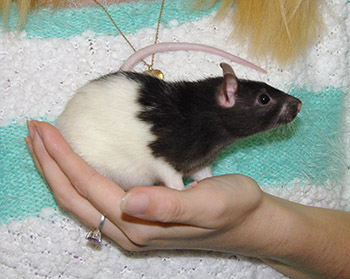
Common health issues
- Tumours - these can be removed under general anaesthesia. Although anaesthetic risks are higher for these small mammals, we still regularly remove these lumps successfully using safe gaseous anaesthetics and careful monitoring.
- Mycoplasma - this respiratory organism can cause chronic respiratory “snuffling” symptoms and may require long term antibiotic treatment and strict hygiene to control.
- Mites can cause intense itching, inflammation and hair loss. We can recommend products to eliminate these.
 Mice
Mice
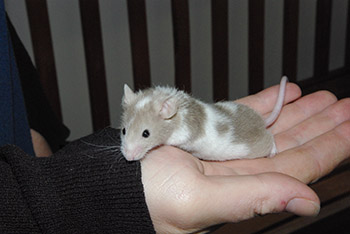
Like rats, the most common disease we see in mice are tumours in various parts of the body. Sometimes we have removed tumours from mice that are almost as big as the mouse itself!
 Ferrets
Ferrets
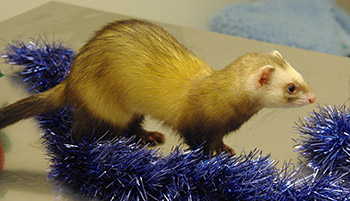
Vaccination
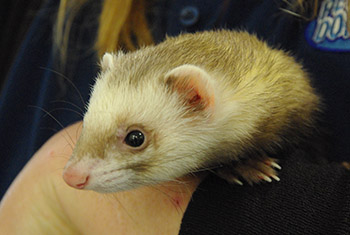
Desexing
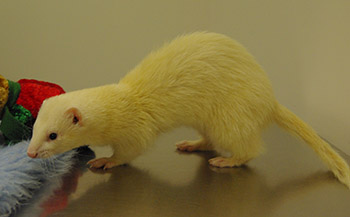
We also have available a hormonal injection that will postpone or delay oestrus in females. This can be used to prevent oestrus for a period of time before mating or desexing.
Ferrets have quite a strong scent that is emitted from their anal glands. Desexing of both males and females will reduce this odour, making them easier to keep as inside pets.
 Birds
Birds
 Birds come in all shapes and sizes and can make wonderful pets in the right environment. When looking at purchasing a bird, it’s important to pick a type that is suitable for your lifestyle. Some breeds such as canaries and finches are quite independent and low maintenance when kept in a group, while others such as the large parrots require lots of stimulation and interaction with their owners, particularly when kept as a sole bird. One of the most common bird types we treat is the humble backyard chicken. Chickens make surprisingly good pets, particularly for older children and adults and can be tamed so they are very friendly. At The Mt Barker Vet Clinic we are are fully equipped to look after your avian friend. General Health examinations,evaluation of body condition as well as the following are provided.
Birds come in all shapes and sizes and can make wonderful pets in the right environment. When looking at purchasing a bird, it’s important to pick a type that is suitable for your lifestyle. Some breeds such as canaries and finches are quite independent and low maintenance when kept in a group, while others such as the large parrots require lots of stimulation and interaction with their owners, particularly when kept as a sole bird. One of the most common bird types we treat is the humble backyard chicken. Chickens make surprisingly good pets, particularly for older children and adults and can be tamed so they are very friendly. At The Mt Barker Vet Clinic we are are fully equipped to look after your avian friend. General Health examinations,evaluation of body condition as well as the following are provided.
Wing, Nail and Beak Trims
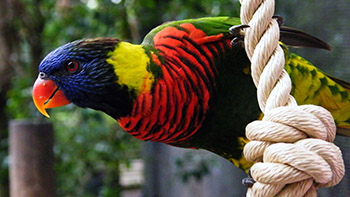 We are experienced at wing clips that will allow your bird to glide to the ground if they need to and a short flight to get out of a situation but will prevent them from full flight stopping them flying away.
We are experienced at wing clips that will allow your bird to glide to the ground if they need to and a short flight to get out of a situation but will prevent them from full flight stopping them flying away.
Birds use their feet for practically everything -- walking, grasping food, and holding onto branches, perches, cage bars, and toys. If their nails aren't kept in good order, many aspects of their lives can be greatly affected as a result. If your notice your bird's nails getting "hung" on your clothing, in bits of food, or on other surfaces, then it's definitely time for a trim. Nails of a healthy length will be enough to give your bird traction without hindering his or her efforts at getting around.
Much like our fingernails, a bird's beak grows continuously throughout its life.
Normally, a healthy bird's daily activities include plenty of chewing, eating, and foraging, which help keep the beak ground down to the proper length and shape. Birds can also often be observed rubbing their beaks on rough surfaces to help the process along.
Most pet birds that are provided items such as natural wood perches and cuttlebones are able to keep their beaks in good shape. However, now and then a bird's beak becomes overgrown, oddly shaped, or damaged and when this happens, a beak trim is necessary to fix it. Deformed beaks may also result from a mite infection
Diet
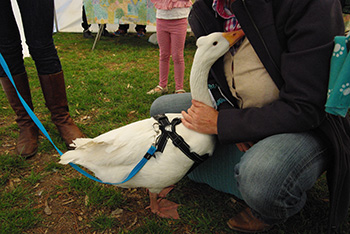
Pathology
 We can do in house Crop and Faecal smears and check for worms and other parasites.
We can do in house Crop and Faecal smears and check for worms and other parasites.
Many birds require general anaesthesia for blood collection. We have safe gaseous anaesthetics that we can use to provide the short term anaesthesia required- blood is then sent to the laboratory and we usually have results within 24 hours.
Surgery
 We regularly perform surgery on birds, we use anaesthetic gas to provide mask induction, then intubate the larger birds and maintain on gaseous anaesthetic during surgery. The most common surgeries we perform are orthopedic procedures (fractures) of the legs or wings and tumour removal.
We regularly perform surgery on birds, we use anaesthetic gas to provide mask induction, then intubate the larger birds and maintain on gaseous anaesthetic during surgery. The most common surgeries we perform are orthopedic procedures (fractures) of the legs or wings and tumour removal.




